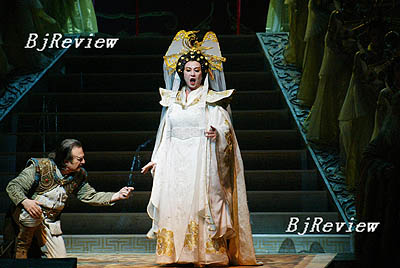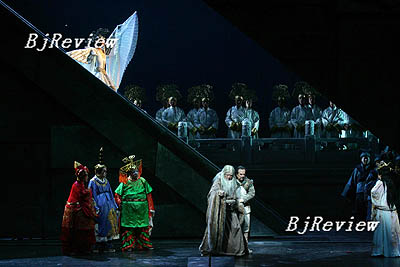|

It has long been the wishes of many classical opera fans and sopranos alike that the heroine of Italian composer Giacomo Puccini's classic Turandot, Princess Turandot, had her own aria. And now that wish has just come true. In the new edition of the opera presented by the National Center for the Performing Arts (NCPA) of China in March, the princess sang a beautiful and moving aria, named The First Tears, transforming herself in the process from a cold-hearted woman with infinite power into an ordinary girl falling in love with Prince Calaf, the hero of the opera.
The aria comes in the last 18 minutes of the opera, and was written by young Chinese composer Hao Weiya, making him the third composer in the world to score the final part of Puccini's unfinished masterpiece. Besides the aria, Hao also wrote a duet for Turandot and Calaf.
As the opera tells an orient story and Puccini weaved the Chinese folk song Jasmine into his score, Turandot is widely believed to be connected to China, which is rare among the classic opera works in the world. Turandot is also Puccini's last work, and this year marks the 150th anniversary of the birth of the master composer, which is why the NCPA decided to produce and stage Turandot in its opening season.
The new ending is an attempt by the NCPA to give more substance to the inner feelings of the characters, especially in the final scenes of the opera. In the former two endings staged after Puccini's death in 1924, Hao said that while Princess Turandot was finally moved by the sincerity and bravery of Prince Calaf and the death of Liu, a servant girl of Calaf's father, examining the inner emotions of the princess was not fully explored. Hao said for precisely this reason he had written the solo.
This idea has also aroused the interest of the Italy Foundation of Festival Puccini, which co-produced the NCPA's rendition in China, and is also a major reason for the copyright owner of Puccini's works to authorize Hao to write a new ending for the opera.
Hao once said that he would like to look at Turandot as an opera with a theme of love, despite the ancient fable, originating in Persia but set in China, telling the story of a cruel but beautiful princess who declares that any suitor must answer three riddles correctly, or be beheaded, in her quest to avoid marriage.
"Princess Turandot should not be too tough and merciless throughout the opera, and she should become gentle and enjoy the feeling of loving and being loved in the end," said Hao.
Besides the final aria, Hao has also added the element of Liu, who actually plays an important role in softening the princess' heart. "Turandot's tears in the end are for love and also for the death of Liu, and they are tears that show the strength of the power of love," Hao said.
In fact, the other two leading characters, Prince Calaf and servant girl Liu, both have their own classical aria-Nobody Shall Sleep for Calaf and Sir, Listen for Liu. Hao hopes that the aria he wrote for the princess will be liked and remembered by opera lovers.
Hao insists he has kept the soul of the opera and followed the style of Puccini.
"Our principle is to respect the original version of the master, but it is more difficult to adhere to the original work than to create a new piece," Hao said.
Turandot was produced 80 years ago, so it is inevitable that modern elements are added to continue to attract the audiences of today, said Hao. And as most people participating in the creation of the NCPA edition are Chinese it is a challenge to well blend the Chinese and contemporary elements in the new version, he said.

"Opera is rooted in the West, and it is rather difficult for people in the East to enter the world of opera. We are all novices in terms of Western opera," Hao said. "And we should learn from Western opera masters."
According to Hao, who received the call to write a new ending from the NCPA in June 2006, he was influenced by three kinds of music sources. The first is Chinese music, as tradition says that an opera will use some elements of the country where it is performed. The second is the 23 pages of Puccini's sketches and notes, with only minor changes made in choosing instruments. And the third source is his own music, which Hao hopes has merged so seamlessly into the original score that audiences will not be able to tell which part is his own creation.
After watching the NCPA edition of Turandot, Franco Moretti, General Manager of IFFP, said the last 18 minutes was beautiful, adding that he hoped Hao's ending has created a new era. "The NCPA version is the most beautiful and moving Turandot that I have ever watched, " said Moretti.
"Mr. Hao has not only respected the opera art of Italy but also gives a fresh translation of the opera Turandot," Moretti said. He also hopes the cooperation of both Italian and Chinese artists will make more Chinese familiar with Puccini and his works.
Moretti also said that the NCPA version of Turandot made him realize that absorbing Eastern cultural elements may be the future direction of the development of opera.
Lu Jia, a Rome-based Chinese conductor who conducted the NCPA rendition in turn with an Italian conductor, also expressed his appreciation of Hao's creation following the style of the original piece. He thinks the use of instruments in the last 18 minutes is good as it carries a strong Chinese style. He also thinks that the new ending is more mature and closer to Puccini's conception compared with the former two endings in developing the plot and unfolding the inward change of the Princess.
Such recognition and positive comments have greatly encouraged Hao, who admitted he had put in endless hours of research in trying to get into Puccini's head.
The new edition of the opera proved to be a big hit in Beijing and is the grandest performance that the city's new state of the art theater has presented to date, attracting some 14,000 people during its six-day performance. Princess Turandot and Prince Calaf were played successively by Italian soprano Giovanna Casolla and tenor Nicola Martinucci and Chinese soprano Sun Xiuwei and tenors Dai Yuqiang and Wei Song.
At the debut of the NCPA edition of Turandot on March 21, representatives of the Italy Foundation of Festival Puccini granted the Puccini Achievement Award to Chen Ping, head of the NCPA, expressing the Foundation's recognition of NCPA's efforts in presenting a new version of Turandot. | 